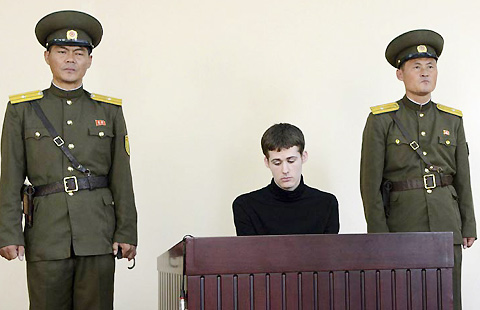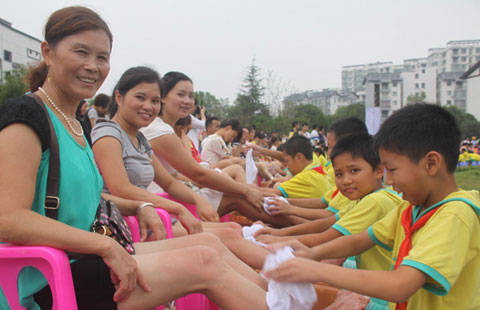Opera school where the past is a lesson for the future
Updated: 2014-09-16 13:03
By Huang Zhiling(China Daily)
|
|||||||||||
“Lower your leg, please,” Wang Yumei gently says before helping her student Liang Xiaoju adjust her leg on a bar in a spacious room in the Chengdu School of Culture and Art in the western suburbs of the capital of Sichuan province.
“Placing legs on the bar is a routine procedure in training opera students,” the 39-year-old teacher said.
Liang, 15, is one of 34 students in the Sichuan Opera class. With ages ranging from 9 to 17, the students will perform in the Sichuan Opera Theater of Chengdu upon graduation in 2016.
“They will be the first school-trained Sichuan Opera performers enrolled in the theater in more than two decades,” said Wang, an actress with the theater.
Since 1992, her theater has recruited a small number of performers from districts and counties in Sichuan but without a school dedicated to training performers the sustainability of Sichuan Opera, with a history of more than 300 years, cannot be ensured.
In 2012, the Chengdu municipal government offered funds to enroll students for the theater who would be trained in the Sichuan Opera class at Chengdu School of Culture and Art.
“Some 600 students from different parts of Sichuan took the exams. Only 34 were selected,” says Zhang Xiaojun, principal of the Chengdu School of Culture and Art.
Most of the 34 students had not learned Sichuan Opera. “They were chosen because of their appearance, clear pronunciation in singing and proficiency in imitating Sichuan Opera performers on the scene,” says Wang, a member of the selecting committee. Two years ago, she won the Plum Blossom Prize, China’s top dramatic performance award.
Food and lodging is free for the students during their four years of study because of an allocation of more than 1 million yuan ($161,290) from the government each year.
Students study Chinese, history, geography and English but major in singing, posture expression, martial arts and ballet.
“Young and middle-aged performers in my troupe as well as retired masters like Wei Yixin teach the students,” Wang says.
Wei, 78, has devoted all his lifetime to the young male role and is a master in his field. Because of his advanced age, Sichuan has received funding from the Ministry of Culture to make a video of his performances.
Each week, he spends three half days training students in the Sichuan Opera class. “He is patient. When he finds a student suitable for a particular role, he will try his best to teach him,” says He Zhengmao.
Thanks to Wei, the 12-year-old student from a farmer’s family in Lanxi county in Sichuan is doing well in the young male role.
While most students had no knowledge of Sichuan Opera before they were recruited, a few are from families whose parents are performers or grandparents are lovers of the Sichuan Opera.
Liang is from Yongchuan county in neighboring Chongqing municipality. Her grandmother is an amateur Sichuan Oprea performer.
Liang who is good at the female martial arts role is learning to play Yang Paifeng, a maid in charge of stove fire in the kitchen in the residence of a general in the Northern Song Dynasty (960-1127). The maid is said to have used a stove poker to save Yang Zongbao, the young son of the general from the enemy.
Liang had a fracture with one toe in a martial arts training session last year. “Injury is not anything uncommon in training sessions. But I do not regret learning Sichuan Opera,” she says.
Hot Topics
The newly announced overhaul of China's college entrance exam and university enrollment system requires support from all walks of life, said a commentary in the Communist Party of China's flagship newspaper.
Editor's Picks

|

|

|

|

|

|







